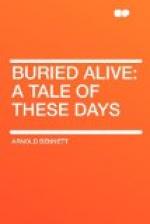Special large type! Titles stretching across two columns! Black borders round the pages! “Death of England’s greatest painter.” “Sudden death of Priam Farll.” “Sad death of a great genius.” “Puzzling career prematurely closed.” “Europe in mourning.” “Irreparable loss to the world’s art.” “It is with the most profound regret.” “Our readers will be shocked.” “The news will come as a personal blow to every lover of great painting.” So the papers went on, outvying each other in enthusiastic grief.
He ceased to be careless and condescending to them. The skin crept along his spine. There he lay, solitary, under the crimson glow, locked in his castle, human, with the outward semblance of a man like other men, and yet the cities of Europe were weeping for him. He heard them weeping. Every lover of great painting was under a sense of personal bereavement. The very voice of the world was hushed. After all, it was something to have done your best; after all, good stuff was appreciated by the mass of the race. The phenomena presented by the evening papers was certainly prodigious, and prodigiously affecting. Mankind was unpleasantly stunned by the report of his decease. He forgot that Mrs. Challice, for instance, had perfectly succeeded in hiding her grief for the irreparable loss, and that her questions about Priam Farll had been almost perfunctory. He forgot that he had witnessed absolutely no sign of overwhelming sorrow, or of any degree of sorrow, in the thoroughfares of the teeming capital, and that the hotels did not resound to sobbing. He knew only that all Europe was in mourning!
“I suppose I was rather wonderful—am, I mean”—he said to himself, dazed and happy. Yes, happy. “The fact is, I’ve got so used to my own work that perhaps I don’t think enough of it.” He said this as modestly as he could.
There was no question now of casually glancing at the obituaries. He could not miss a single line, a single word. He even regretted that the details of his life were so few and unimportant. It seemed to him that it was the business of the journalists to have known more, to have displayed more enterprise in acquiring information. Still, the tone was right. The fellows meant well, at any rate. His eyes encountered nothing but praise. Indeed the press of London had yielded itself up to an encomiastic orgy. His modesty tried to say that this was slightly overdone; but his impartiality asked, “Really, what could they say against me?” As a rule unmitigated praise was nauseous but here they were undoubtedly genuine, the fellows; their sentences rang true!
Never in his life had he been so satisfied with the scheme of the universe! He was nearly consoled for the dissolution of Leek.
When, after continued reading, he came across a phrase which discreetly insinuated, apropos of the policeman and the penguins, that capriciousness in the choice of subject was perhaps a pose with him, the accusation hurt.




